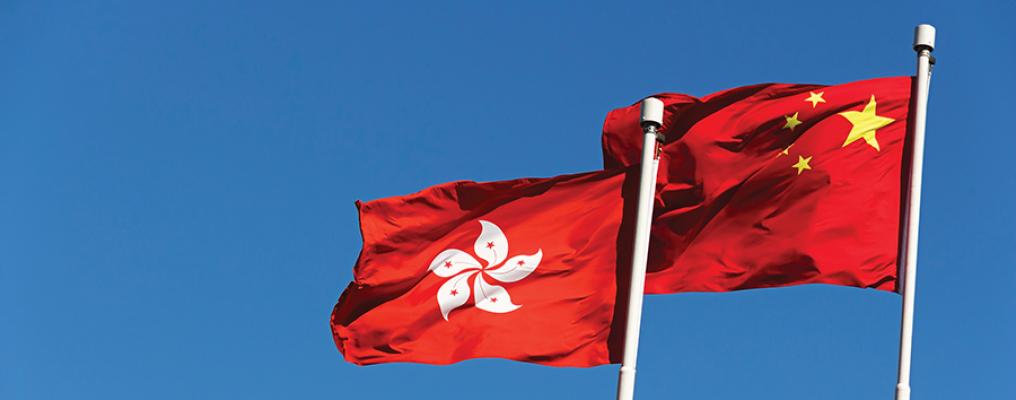Guo Xiangdong FCIS FCS, Deputy General Manager and Board Secretary, Guangshen Railway Co Ltd, looks at the role of the board secretary in Mainland China and compares it to the role of the company secretary in Hong Kong.
The Company Law of the People's Republic of China recognises the board secretary of a listed company as a member of senior management, sharing legal responsibilities with the directors for certain tasks required by the Company Law.
As China's securities market and its regulatory framework continue to mature, the role of the board secretary in promoting and maintaining corporate governance best practices is growing. According to the Company Law and the listing rules of the Shanghai and Shenzhen stock exchanges, the primary responsibilities of the board secretary include:
- assisting the company and the board of directors in establishing a comprehensive internal control system
- ensuring compliance with disclosure requirements, and developing and improving the company's disclosure management system
- maintaining effective communications with regulators and assisting the board in responding to inquiries made by the stock exchange in a timely manner
- organising board and shareholder meetings, including preparing agendas and taking minutes
- managing the company's stock rights, assisting in investor communications and managing shareholder information
- preparing and organising regular training on rule and regulation updates for directors, supervisors and senior management, and implementing control measures to facilitate compliance.
The Shanghai Stock Exchange (SSE) requires the board secretary to uphold corporate governance best practices, such as establishing a sound internal control system, fulfilling information disclosure requirements, avoiding horizontal competition and fulfilling compliance requirements relating to connected transactions. The board secretary should also assist in the formulation of the company's financing strategy in capital markets, and plan or implement the company's financing, M&A or other corporate restructuring strategies.
The board secretary is the person designated to provide the contact between the listed company and the SSE, handling information disclosure, corporate governance, equity management and other issues on behalf of the listed company.
Comparing the 'board’ and the 'company’ secretary
The most obvious difference between corporate secretaries in Mainland China and Hong Kong is their professional title – they are called 'board secretaries’ in the Mainland and 'company secretaries’ in Hong Kong. The differences, however, do not stop there.
As required by Hong Kong's Companies Ordinance and listing rules, listed issuers in Hong Kong must have a company secretary in place, reporting to the chairman of the board and/or the CEO. The company secretary's responsibilities include:
- maintaining regular communications to ensure the smooth exchange of information among members of the board
- advising the chairman and CEO on corporate governance matters, and assisting the company in improving corporate governance standards
- preparing and disseminating crucial information, such as meeting agendas, to all board members and committees, and record keeping
- identification and disclosure of inside information
- reminding all directors of their responsibilities to fulfil their disclosure obligations and to pay attention to restrictions with respect to securities trading that are subject to disclosure, such as connected transactions and insider trading, and
- arranging induction and the professional development for directors, and establishing continued training programmes for directors and senior management.
The company secretary needs to be familiar with the Companies Ordinance, the Securities and Futures Ordinance, the listing rules, and other relevant rules and regulations, so as to ensure that the company and its directors comply with applicable rules and regulations.
While board and company secretaries share similarities in their roles – there is a significant overlap, for example, in terms of their responsibilities and duties – some interesting divergences between Hong Kong and Mainland practices exist. There are differences, for example, in their status within the company and the qualifications and experience they are expected to have.
The SSE and Shenzhen Stock Exchange (SZSE) rules confirm that the board secretary is a senior officer of the listed company appointed by the board of directors, with the approval of the SSE or SZSE. Anyone appointed as the board secretary of a listed company must have:
- good professional ethics and integrity
- expertise in finance, management and the law, sufficient for performing his or her duties
- work experience necessary for the performance of his or her duties, and
- board secretary qualification certificate(s) recognised by the respective stock exchange.
The Hong Kong listing rules requires company secretaries to be 'appropriately qualified’. The stock exchange considers the following professional qualifications for company secretaries to be acceptable, they should be:
- a member of The Hong Kong Institute of Chartered Secretaries
- a solicitor or barrister (as defined in
the Legal Practitioners Ordinance), or
- a certified public accountant (as defined in the Professional
Accountants Ordinance).
Hong Kong Exchanges and Clearing Ltd (the Exchange) also requires company secretaries to have 'relevant experience'. In assessing relevant experience, the Exchange will consider the individual's:
- length of employment with the issuer and other issuers, and the
roles performed
- familiarity with the listing rules
and other relevant law and regulations including the SFO, Companies
Ordinance, and the Takeovers Code
- relevant training taken and/or to be taken in addition to the minimum requirement under Rule 3.29 of the listing rules, and
- professional qualifications in other jurisdictions.
In Mainland-listed companies, the board secretary needs to be approved by the stock exchange as well as the board, and has to be appraised annually. The SSE rules contain a range of punishments for violations by board secretaries.
Some Hong Kong-listed companies outsource the role of the company secretary to an external party. These company secretaries usually liaise with a senior manager or a director in carrying out their duties. In contrast, Mainland companies listed on the Shanghai and/or Shenzhen exchanges, or those dual-listed in the Mainland and Hong Kong, usually appoint a senior executive as the board secretary.
The future of the role
As the regulatory environment continues to consolidate and improve, requiring listed companies to meet higher corporate governance standards, the role of board and company secretaries is becoming more complex and more professional. Ever since the introduction of the new PRC Company Law, the board secretary has been officially recognised as a member of senior management. This status empowers board secretaries to properly fulfil their duties as required by law and as gatekeepers of good corporate governance.
As part of senior management, the board secretary and company secretary should not only be familiar with the company's business nature and day-to-day operations, but should also be familiar with all the rules and regulations that apply to listed companies. The board secretary and company secretary report to the board on compliance and corporate governance matters in a timely manner, and also ensure that the decisions made by the board are properly executed. Last but not least, the board secretary and company secretary not only maintain communications between the company and investors, but also maintain effective communications with regulators on behalf of the company.
Guo Xiangdong FCIS FCS
Deputy General Manager
and Board Secretary,
Guangshen Railway Co Ltd
董事會秘書之職業定位
廣深鐵路股份有限公司副總經理兼董秘郭向東比較內地上市企業董秘與香港上市企業公司秘書的差異及專業發展方向。
《中華人民共和國公司法》("《公司法》”)要求上市公司設立董事會秘書並確認上市公司的董事會秘書為高級管理人員,從法律上確立了董事會秘書的地位。
隨著中國證券市場的發展以及相關的法律法規的日趨完善,董事會秘書在上市公司企業管治方面的作用日趨重要。 根據《公司法》和滬深兩地的上市規則,董事會秘書對上市公司及其董事會負責,其主要職責包括:
• 負責協助公司及其董事會建立健全的內部控制制度;
• 負責公司資訊披露事務,制定並完善公司資訊披露管理制度;
• 負責保持與監管機構之間有效的溝通,並協助董事會及時回復交易所的監管問詢;
• 組織籌備董事會會議及股東大會等會議,負責會議記錄;
• 負責公司股權管理事務,組織協調公司投資者關係和管理股東資料;以及
• 組織董事、監事和高級管理人員進行相關法規及規定的培訓,並督促董事、監事和高級管理人員遵守合規事項等。
根據上交所發佈的《上海證券交易所上市公司董事會秘書管理辦法》(“《管理辦法》”),董事會秘書協助上市公司董事會在建立健全內控制度、履行信息披露義務、避免同業競爭及減少關聯交易等方面加強公司治理機制建設,並協助上市公司董事會制定公司資本市場發展戰略,籌划或者實施公司資本市場再融資或者並購重組事務。
董秘與公司秘書的異同
企業發展至二十一世紀,公司秘書已成為了企業不可或缺的企業高級管理人員。 根據香港《公司條例》及香港《上市規則》的要求,公司須設有一名公司秘書,向董事會主席和行政總裁彙報。 其主要職責包括:
• 維護日常聯絡,確保董事會成員之間資訊交流暢通;
• 透過主席和行政總裁向董事會提供有關公司管治事宜的意見,以協助公司完善企業管治;
• 向董事會和其下設委員會提供會議議程等資料,處理會議有關事宜,負責檔案紀錄;
• 鑒別和披露內幕消息,並監督內幕消息的整理和上報;
• 提醒董事履行披露責任和注意證券交易方面的限制,並監督須予披露的交易、關連交易及董事的證券交易的披露;以及
• 安排董事的入職培訓及專業發展,為董事和高層管理人員設立持續培訓計划等。
同時, 公司秘書應熟知《公司條例》、《證券及期貨條例》、《上市規則》等相關法例和規則的要求,協助董事會確保公司和其董事遵守適用的法例和規則。
雖然董事會秘書與公司秘書的在公司治理和證券監管方面的職責日趨相同,但在具體執業上仍存在著以下幾點差異:在執業資格方面,根據《管理辦法》和《深圳證券交易所股票上市規則(2014年修訂)》,擔任上市公司董事會秘書,應當具備以下條件:(1)具有良好的職業道德和個人品質;(2)具備履行職責所必需的財務、管理、法律等專業知識;(3)具備履行職責所必需的工作經驗;及(4)取得本所認可的董事會秘書資格證書。
而香港《上市規則》規定,公司秘書必須為香港聯交所認為在學術或專業資格或有關經驗方面足以履行公司秘書職責的人士。 其中香港聯交所接納下列各項為認可學術或專業資格:(1)香港特許秘書公會會員,(2)香港《法律執業者條例》所界定的律師或大律師或(3)香港《專業會計師條例》所界定的會計師。 評估是否具備「有關經驗」時,香港聯交所會考慮下列各項:(1)該名人士任職于發行人及其他發行人的年期及其所擔當的角色;(2)該名人士對香港《上市規則》以及其他相關法例及規則的熟悉程度; ( 3 )該名人士是否曾經或將會參加相關培訓;及(4)該名人士于其他司法權區的專業資格。
在執業考核方面,公司秘書通常須接受公司董事會的考核,並由公司董事會決定其遴選、委任及解聘等事宜。而在上交所上市的公司的董事會秘書除向公司董事會負責並受其考核外,須接受上交所的年度評估,若其違反《上交所上市規則》,上交所可給予通報批評、公開譴責或公開認定不適合擔任董事會秘書等懲戒措施。
在委聘方面,一部分香港上市公司選擇外聘公司秘書服務中心擔任其公司秘書,並且公司根據監管要求另指定一名公司內部職位較高的人士與外聘機構進行聯絡。 而在滬/深上市或滬港/深港兩地上市的公司通常委任公司內部的一名其高級管理人員擔任董事會秘書。
董秘與公司秘書的未來發展方向
綜上而言,隨著監管要求的提高以及上市公司治理制度的完善,董事會秘書與公司秘書的發展均日趨職業化、專業化。 新《公司法》出臺後,董事會秘書的高管地位得到了法律上的認可,過去由於缺乏高管地位而造成的董事會秘書權責不均衡的情況也得到了改善。 作為公司高級管理人員以及公司良好企業管治不可或缺的環節,無論是公司秘書還是董事會秘書,不僅須熟悉公司的業務性質和日常經營管理,並且須熟知上市公司的監管要求;不僅需向董事會及時上報決策資訊,並且需監督董事會的決策得以有效實施;不僅應作為股東與公司溝通的橋樑,並且應成為公司與監管機構及時溝通的有效管道。
郭向東
公會資深會士
廣深鐵路股份有限公司
副總經理兼董秘


